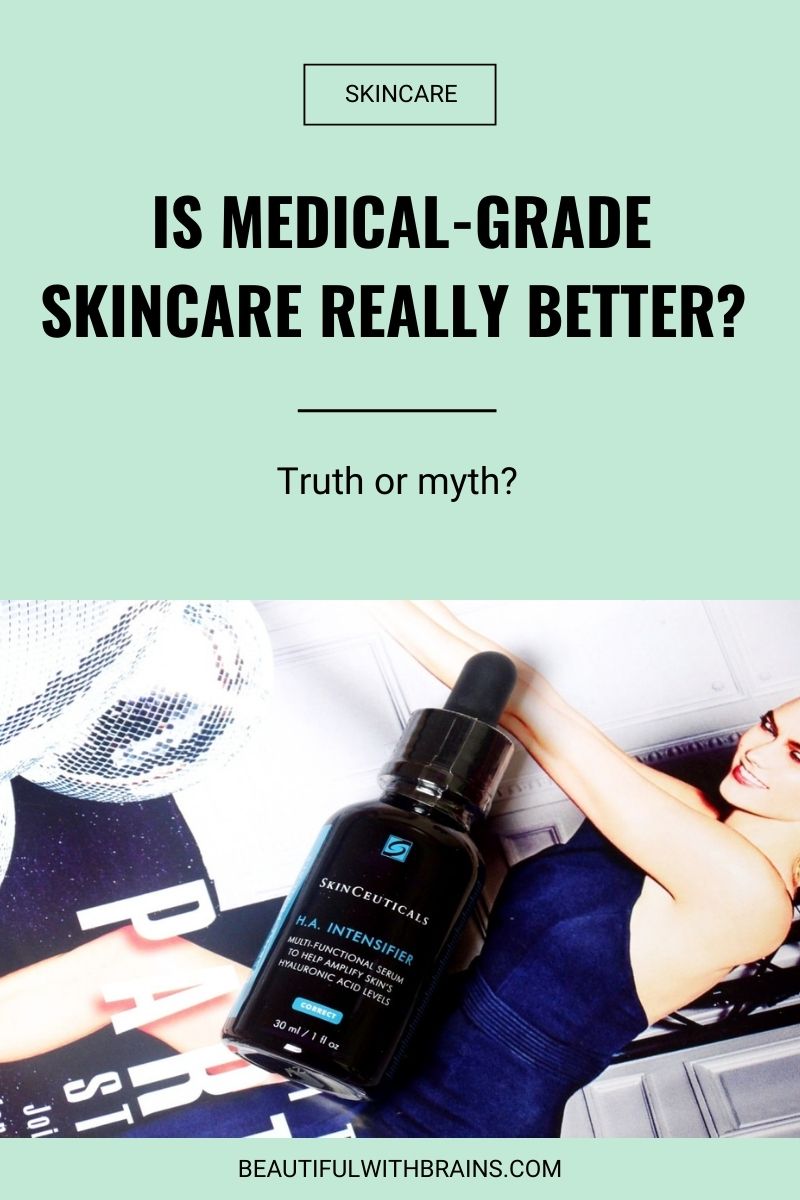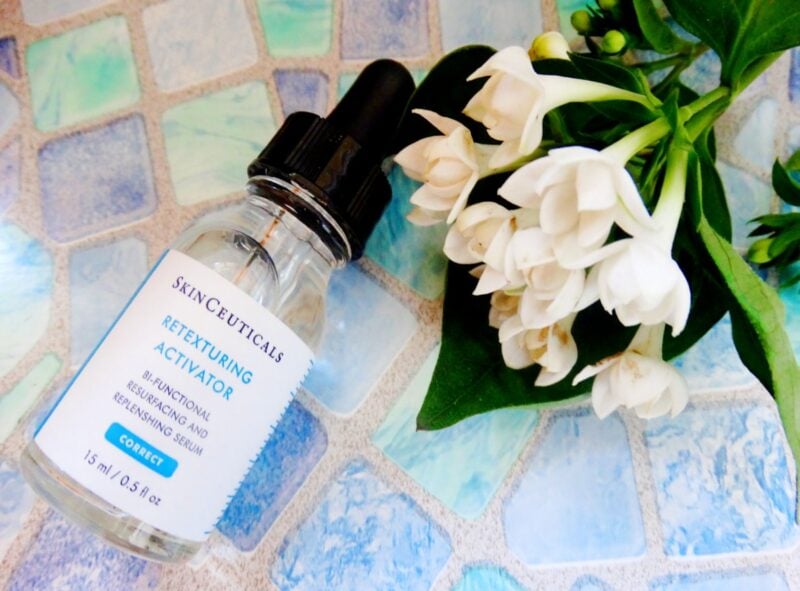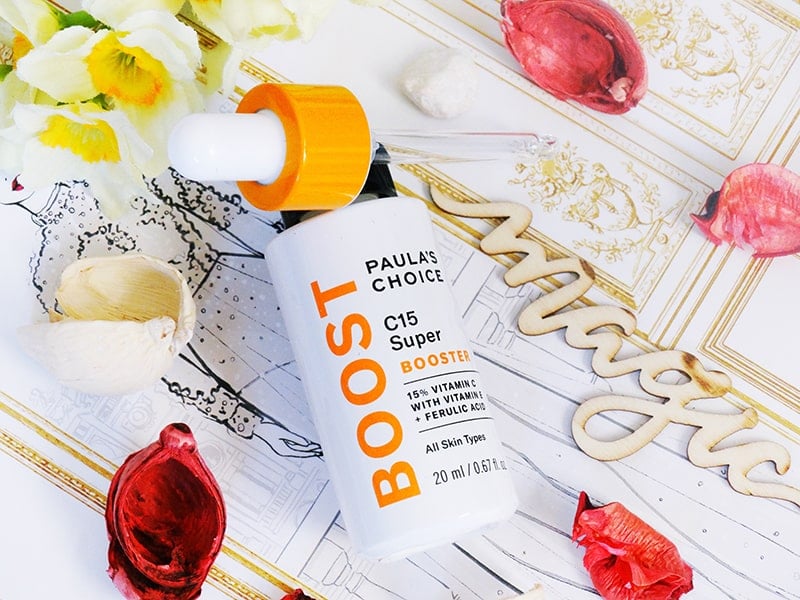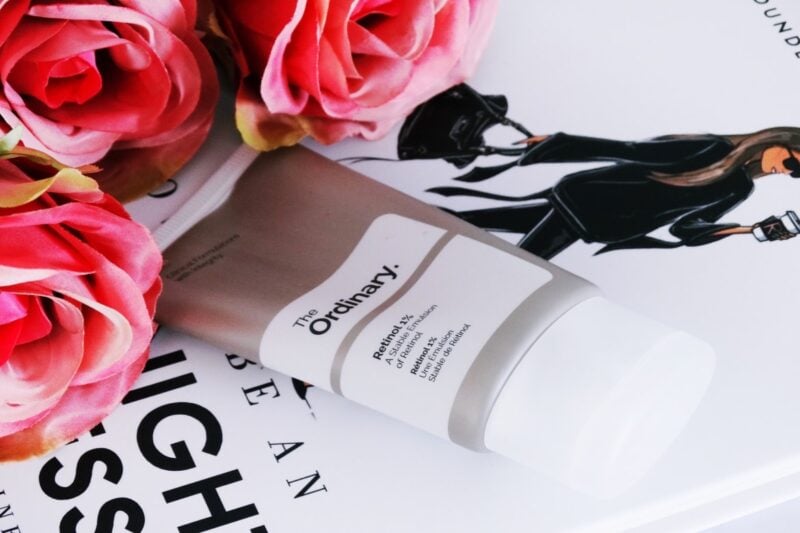
Is “medical-grade skincare” better than your regular, over-the-counter products you can buy at the drugstore?
Social media thinks so. You can’t scroll through Instagram these days without coming across aestheticians singing the praises of (usually outrageously expensive) clinical products… and making you feel like you’re missing out if you can’t afford the splurge.
This is why you should never trust what you read on some random Instagram account (or hear from well-intentioned aestheticians who repeat everything brands tell them without questioning it).
Truth is, there’s no such thing as medical-grade skincare. It’s just a myth. Here’s why:
- What’s Medical-Grade Skincare?
- Myth #1: Medical-Grade Skincare Is Different Than Over-The-Counter (OTC) Skincare
- Myth #2: Medical-Grade Skincare Uses Higher Quality Ingredients
- Myth #3: Medical-Grade Skincare Contains High Percentage Of Actives
- Myth 4: Medical-Grade Skincare Penetrates Deeper Into The Skin Than Over-The-Counter Products
- The Bottom Line
What’s Medical-Grade Skincare?
Medical grade skincare. Clinical skincare. Professional skincare. All the same thing.
You can usually buy these products at dermatologist offices, medi spa, and pharmacies, but some make it onto the shelves of your fave beauty stores, too.
Rumour has it, they have a higher concentration of active ingredients, stabler ingredients that don’t go bad within a month, and better delivery systems to ensure those goodies go where they need to go to perform their magic.
The truth is a little different… Medical-grade skincare brands are like all other brands. Some formulate excellent products… and others use their reputation to sell you a basic moisturiser you wouldn’t otherwise touch with a 10 foot pole.
Just because it sounds clinical, it doesn’t mean it’s better. That takes me to the next point…
Struggling to put together a skincare routine that fights wrinkles and gives your skin a youthful glow? Download your FREE “Best Anti-Aging Skincare Routine” cheat sheet to get started (it features product recommendations + right application order):
Myth #1: Medical-Grade Skincare Is Different Than Over-The-Counter (OTC) Skincare
Medical-grade skincare and over-the-counter skincare are the same thing. There, I said it.
Over-the-counter its a term that describes drugs you can buy without prescription. Think cough medicine, aspirin, and skincare products that affect the look of the skin (not the way it functions), like moisturisers and hyaluronic acid serums.
Prescription skincare refers to drugs you can’t get without a prescription from a health care professional. Think most medicines and Tretinoin creams. They’re usually harsh and may have severe side effects, hence why you need to take them under medical supervision.
Unlike over-the-counter and prescription skincare, the term medical-grade (or clinical/professional) skincare is NOT regulated at all.
There are no requirements a products needs to meet to be labelled medical-grade. The only thing it can’t contain is prescription-only drugs (or you’d need a prescription to buy them!).
You know what that means. Medical-grade skincare is over-the-counter skincare in a posher outfit.
Related: What’s The Difference Between A Drug And A Cosmetic (And Why It Matters)

Myth #2: Medical-Grade Skincare Uses Higher Quality Ingredients
If medical-grade skincare isn’t regulated in any way, anyone can put whatever ingredients they want in it (as long as they’re approved for skincare use and NOT toxic), call it “medical-grade” and sell it only through clinics to build a professional rep.
Doesn’t mean the product is any better than what you get at Sephora….
You’ll find plenty of OTC skincare products that use ingredients, like retinol and salicylic acid, with decades of solid research that proves their effectiveness… and plenty of medical-grade products that barely use of a drop of these ingredients. The opposite is also true.
Medical-grade and OTC products have access to the same ingredients. Whether they decide to use the good quality stuff or not has nothing to do with what they call themselves and more with pricing, marketing, and brand ethics.
Related: Are Drugstore Products As Effective As High-End Products?

Myth #3: Medical-Grade Skincare Contains High Percentage Of Actives
In skincare, more effective usually means more irritating. It’s all about finding that balance between effectiveness and tolerability.
When an ingredient is as harsh as retinol or glycolic acid, the law will regulate the maximum amount it can be used in non-prescription products. That applies to both medical-grade and OTC products (because they are the same thing!).
Again, whether a brand decides to use the maximum concentration allowed by law or only a drop has nothing to do with the label. You can find drugstore products that use the maximum amount of retinol and medical-grade products that use only the tiniest drop – and vice versa.
Pay attention to the ingredient list, not the marketing hype.
Related: What Percentage Of Retinol Is Right For YOU?

Myth 4: Medical-Grade Skincare Penetrates Deeper Into The Skin Than Over-The-Counter Products
I know I’m starting to sound like a broken record now, but bear with me.
How deep an ingredient penetrates into the skin depends on the formulation and the delivery system it uses. Some brands have patented delivery systems that perform a little better, but they don’t necessarily call themselves medical-grade.
Unfortunately, delivery systems aren’t something the average consumer can easily identify on a label. The best you can do is to judge a product based on its performance on your skin, not on marketing claims.
The Bottom Line
Medical-grade skincare IS over-the-counter skincare. It has access to the same actives, the same concentrations, and the same delivery systems. Whether they use them or not is another matter entirely… Judge each product on its own merits, not how the brand markets it.
